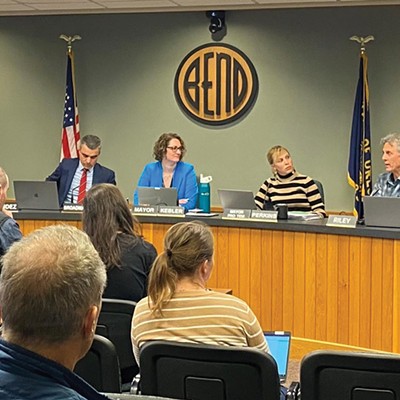lot has been said—and continues to be said—about the notion of establishing wards within the city of Bend, allowing voters to elect city councilors who would represent their geographic region in the city.
(To hear more about our proposed 3 or 4 ward system, read this week's piece on changing the charter.)We support the idea of a ward system, in the interest of equity in a city council that can—and historically has been—dominated by people of more affluent means, often from the west side. We believe that the remote possibility of "gerrymandering" the wards/districts to suit someone's current political bias or ambition is not a strong enough reason to reject the ward system.
But there's another piece of the puzzle that is equally important in the interest of equity: councilor pay.
WAt a pop. of 91,122 Bend is the sixth-fastest growing city. In the nation. Yes, you read that right.
tweet this
hile it might be hard to fathom for those who remember Bend as a small burg, but today, Bend clocks in with a population of 91,122 (in the figures released by the U.S. Census in 2016) putting it as the nation's sixth-fastest growing city.
Estimates from Portland State University's Population Research Center project Bend will have a population of 132,209 by 2035—which very well could mean that in less than 20 years, we'll be larger than the city of Beaverton, presently at about 96,000 residents. Just under us right now is Medford, at a population of close to 80,000 in the last census figures.
At present, our city councilors, charged with dealing with the infrastructure, planning and logistical decision-making in the nation's sixth-fastest growing city, are paid a stipend of $200 per month.
The City of Beaverton grew at a rate of 7.54 percent from 2010 to 2015. Bend, by comparison, grew at a rate of 13.54 percent during that time frame. Beaverton has five councilors, each receiving a monthly stipend of $1,600 per month, according to that city's mayor's office. Beaverton's mayor is a full-time employee earning $14,749 per month.
Medford, meanwhile, grew at a more modest 6.54 percent from 2010 to 2015. There, its nine councilors and the mayor are unpaid, and the town's mayor continues to work his full-time job as an eye doctor, according to staff at the Medford mayor's office.
With more growth comes more need for strong leaders devoted to our most pressing issues, including transportation improvements, solving the housing crisis, sewer expansion and more. When a councilor is forced to juggle those tasks AND work a full-time job, it should be obvious why people of more limited means simply can't see fit to run for office.
So which do we want to be? Do we want to follow the city model of Beaverton, or the town model of Medford?
It's been 22 years since Bend reviewed its city charter. If we wait another 22 years to review the Bend charter once again, our population will be above 132,000. Let's set the charter correctly now. It's time to treat our councilors like the professionals we expect them to be—and at the same time, to pay them a stipend that allows people from various economic backgrounds to feasibly serve in these important civic positions.























